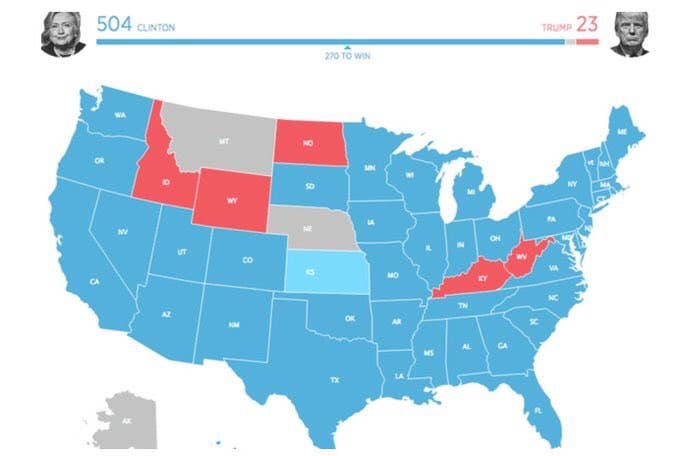Video games Trump hate
Weekly Roundup: In the fallout of a shocking US election, the game industry can rise above and be more inclusionary
This has been one of the most trying weeks in my 15-year career writing about video games. When it feels like your country is in turmoil, it's a bit difficult to focus on something as "meaningless" as games. But if ever there was a time when people needed escapism, now would be it.
Games have the power to transport us to mystical worlds and to do things that are simply impossible in the real world. Importantly, they also have the power to encourage powerful emotions, like love and empathy. Whether you're living through war as a vulnerable bystander (This War of Mine), watching your son suffer from a terminal cancer (That Dragon, Cancer), or acting as an immigration officer who decides which people are let into the country (Papers Please), games can foster deep connections to characters that ultimately (hopefully) lead us to reflect on our own lives and how we treat one another.
Not every game appeals to everyone, and that's okay. But as developer Brie Code pointed out in a hugely popular column for GamesIndustry.biz this week, there's unfortunately a huge swathe of the population that doesn't see any game as appealing. And from a business standpoint, if the industry wants to grow, that's a huge hole in the market that needs to be addressed. Developers like Brie should be applauded because they're seeking to actually evolve the medium.
"Young people play games, young people are the future. This industry can and will rise above the hate"
"At my studio we are making games with people who don't like video games because we want to break out of established paradigms. We want to think about ideas from different angles and draw on different references. We want games that aren't gritty, toxic pseudo-realistic pseudo-masculine nonsense nor frustrating time wasters that leave you feeling dead inside. We want games about how each of us could be in the future, how the world could be in the future. We want games built on compassion and respect and fearlessness. This is so much more interesting," she wrote.
Here's the problem, though. There's a segment of the gaming population that takes that sentiment to mean that some developers want to take their games away, that one kind of game is coming at the expense of the traditional AAA shooter. That's just faulty thinking - the Call of Dutys and Battlefields and so on will still be made, and to demand that other types of games for people who aren't "gamers" not be made is flat out exclusionary and wrong.
And that's just it, isn't it? The same undercurrent in society that produced Gamergate, the alt-right movement, Brexit and now a Trump election (bigotry, misogyny, xenophobia, homophobia, religious persecution, fear mongering, etc.) are what led to exclusionary thinking in the game-playing populace. "How dare you change my games?" they'll say. But they aren't "your" games; just because the industry has catered to the 18-34 white male audience over the last two decades doesn't give you some special claim to the medium. Just like movies, books and TV, games are for everyone.
"I'm not remotely interested in shockingly good graphics, in murder simulators, in guns and knives and swords. I'm not that interested in adrenaline. My own life is thrilling enough. There is enough fear and hatred in the world to get my heart pounding. My Facebook feed and Twitter feed are enough for that," Brie said.
In order to enable people like Brie to succeed, we have to get past all that fear and hatred. What saddens me most about the Trump election is that it essentially says to young, impressionable minds that it's okay to say horrible things to women, that it's okay to ban a whole religion, that it's okay to spew hate. In the weeks leading up to this election, one major game conference organizer was called a "bitch" in public for no apparent reason. Then just this week, a fellow game journalist was harassed both in public and on Twitter with comments of "we'll grab you by the pussy." This is NOT okay; it's downright reprehensible.

Here's the good news, however. Hillary Clinton won the popular vote, and young people, age 18-25 overwhelmingly voted for her, as pointed out by Eliza Byard of GLSEN. Young people play games, young people are the future. This industry can and will rise above the hate.
At some point, in the not-too-distant-future, games will be as inclusionary as any other art form. Women, minorities, people of all sexual orientations and faiths will feel welcomed by games and an industry that throws its arms wide open to them. I look forward to that day.
Other news on GamesIndustry.biz this week
Vivendi increased its stake in Ubisoft to 24%
Machine Zone is teaming up with Square Enix to make a FFXV mobile MMO
EA DICE boss Patrick Bach is leaving the studio
The PS4 Pro launched as reviewers wrangled with 4K and HDR
Call of Duty's player base on Steam is declining
Facebook is eyeing a deeper move into the world of eSports
Steam's new discoverability system is having a big impact on developers
